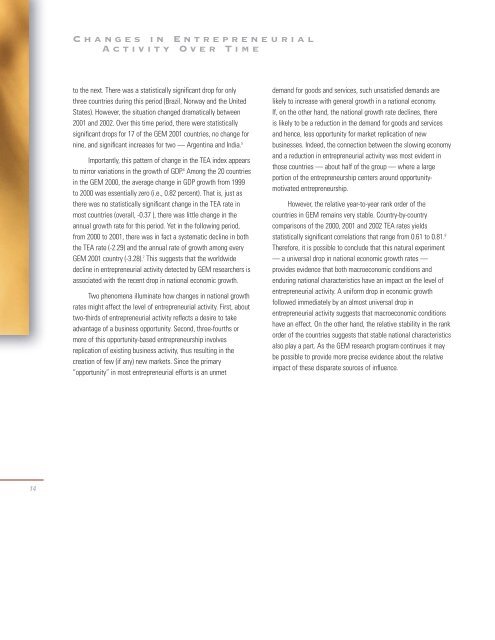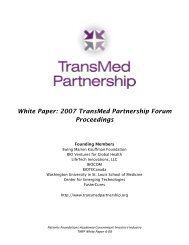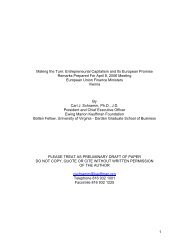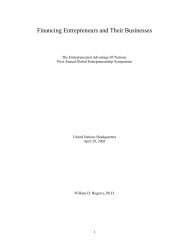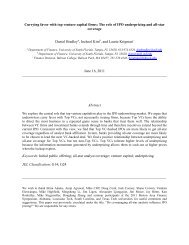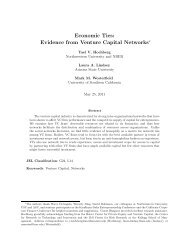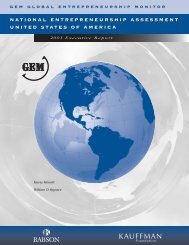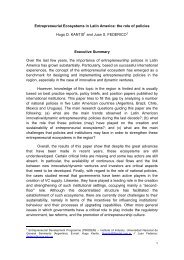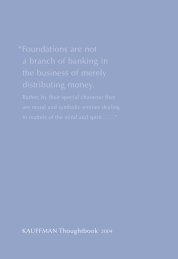Global entrepreneurship report - ResearchGate
Global entrepreneurship report - ResearchGate
Global entrepreneurship report - ResearchGate
You also want an ePaper? Increase the reach of your titles
YUMPU automatically turns print PDFs into web optimized ePapers that Google loves.
Changes in Entrepreneurial<br />
Activity Over Time<br />
to the next. There was a statistically significant drop for only<br />
three countries during this period (Brazil, Norway and the United<br />
States). However, the situation changed dramatically between<br />
2001 and 2002. Over this time period, there were statistically<br />
significant drops for 17 of the GEM 2001 countries, no change for<br />
nine, and significant increases for two — Argentina and India. 5<br />
Importantly, this pattern of change in the TEA index appears<br />
to mirror variations in the growth of GDP. 6 Among the 20 countries<br />
in the GEM 2000, the average change in GDP growth from 1999<br />
to 2000 was essentially zero (i.e., 0.82 percent). That is, just as<br />
there was no statistically significant change in the TEA rate in<br />
most countries (overall, -0.37 ), there was little change in the<br />
annual growth rate for this period. Yet in the following period,<br />
from 2000 to 2001, there was in fact a systematic decline in both<br />
the TEA rate (-2.29) and the annual rate of growth among every<br />
GEM 2001 country (-3.28). 7 This suggests that the worldwide<br />
decline in entrepreneurial activity detected by GEM researchers is<br />
associated with the recent drop in national economic growth.<br />
Two phenomena illuminate how changes in national growth<br />
rates might affect the level of entrepreneurial activity. First, about<br />
two-thirds of entrepreneurial activity reflects a desire to take<br />
advantage of a business opportunity. Second, three-fourths or<br />
more of this opportunity-based <strong>entrepreneurship</strong> involves<br />
replication of existing business activity, thus resulting in the<br />
creation of few (if any) new markets. Since the primary<br />
“opportunity” in most entrepreneurial efforts is an unmet<br />
demand for goods and services, such unsatisfied demands are<br />
likely to increase with general growth in a national economy.<br />
If, on the other hand, the national growth rate declines, there<br />
is likely to be a reduction in the demand for goods and services<br />
and hence, less opportunity for market replication of new<br />
businesses. Indeed, the connection between the slowing economy<br />
and a reduction in entrepreneurial activity was most evident in<br />
those countries — about half of the group — where a large<br />
portion of the <strong>entrepreneurship</strong> centers around opportunitymotivated<br />
<strong>entrepreneurship</strong>.<br />
However, the relative year-to-year rank order of the<br />
countries in GEM remains very stable. Country-by-country<br />
comparisons of the 2000, 2001 and 2002 TEA rates yields<br />
statistically significant correlations that range from 0.61 to 0.81. 8<br />
Therefore, it is possible to conclude that this natural experiment<br />
— a universal drop in national economic growth rates —<br />
provides evidence that both macroeconomic conditions and<br />
enduring national characteristics have an impact on the level of<br />
entrepreneurial activity. A uniform drop in economic growth<br />
followed immediately by an almost universal drop in<br />
entrepreneurial activity suggests that macroeconomic conditions<br />
have an effect. On the other hand, the relative stability in the rank<br />
order of the countries suggests that stable national characteristics<br />
also play a part. As the GEM research program continues it may<br />
be possible to provide more precise evidence about the relative<br />
impact of these disparate sources of influence.<br />
14


